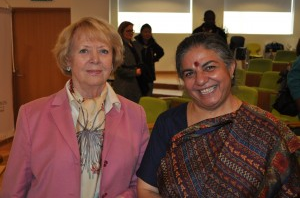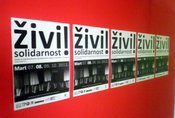Föstudaginn 16. september kl. 14.00-16.00 standa UN Women á Ísland, Rannsóknastofa í kvenna- og kynjafræðum og Alþjóðlegur jafnréttisskóli fyrir málþinginu „War Rapes and Peace-Building in Bosnia and Herzegovina”. Málþingið verður haldið á Háskólatorgi í stofu 105 og fer fram á ensku.
Á undanförnum árum hefur alþjóðasamfélagið, að undirlagi kvenna- og mannréttindasamtaka, lagt aukna áherslu á jafna þátttöku kvenna og karla í formlegum sáttaferlum, samningum og friðaruppbyggingu á stríðs- og átakasvæðum. Þrátt fyrir yfirlýsingar leiðtoga heims um mikilvægi þess að þátttaka kvenna í friðaruppbyggingu sé tryggð er veruleikinn annar þar sem hagsmunaátök eru mikil og hefðbundnar karllægar samfélagsstofnanir og samtök ýta konum jafnan til hliðar. Þó að konum sé mismunað í formlegum friðaruppbyggingarferlum vinna þær oft á tíðum öflugt starf í grasrótinni, en sú vinna fær oft litla viðurkenningu og umfjöllun.
Á málþinginu er sjónum sérstaklega beint að stöðu mála í Bosníu og Hersegóvínu og kvennasamtökum sem hafa, í samstarfi við trúfélög, unnið í þágu friðar- og sáttaferla í landinu. Það starf hefur meðal annars leitt til stofnunar nýs námskeiðs á sviði kynja- og trúarbragðafræða við Sarajevo-háskóla. Einnig verður greint frá störfum frjálsu félagasamtakanna „Medica“ Zenica sem vinna með konum og stúlkum sem hafa lifað af stríðsnauðganir.
Dagskrá
Fundarstjórn: Inga Dóra Pétursdóttir, framkvæmdastýra Landsnefndar UN Women á Íslandi
Lilja Hjartardóttir, stjórnmálafræðingur og sjálfstætt starfandi fræðimaður í Reykjavíkur Akademíunni.
„No vengeance, no violence, clean it and keep it clean“. An overview of the meaning and shortcomings of peace-building from a gendered perspective
Dr. Zilka Spahic-Siljak, yfirmaður MA-náms við Háskólann í Sarajevó og framkvæmdastjóri TPO samtakana í Sarajevó
Negotiating Power Relations: Peace-building and reconciliation between academia and civil society organizations in Bosnia and Herzegovina
Ms. Sabiha Haskic-Husić, M.Sc. og forstöðukona og sálfræðingur hjá “Medica” Zenica
Working with women survivors of war rape, trauma and other types of violence
Pallborðsumræður.
———
On Friday 16 September at 14.00-16.00, UN Women in Iceland, the Centre for Women’s and Gender Research and the Gender Equality Studies and Training Programme at the University of Iceland will host a symposium titled War Rapes and Peace-Building in Bosnia and Herzegovina. The symposium will take place in Háskólatorg, room 105, and will be conducted in English.
For over a decade now, the international community has, on the initiative of various women‘s and human rights organizations, emphasized the need for equal participation of women and men in reconciliation, negotiation and peace-building processes in conflict/post conflict countries and areas. Despite declarations on behalf of world leaders on the importance of securing women’s participation in peace-building efforts, the reality has been different due to conflicting interests of male-dominated institutions and organizations that have marginalized women in these processes. However, although women face discrimination in official peace-building processes, they’ve made important contributions at a grassroot level although their achievements is often not fully recognized and valued.
In the symposium, the focus will be on the situation in Bosnia and Herzegovina and secular women’s organizations that have, in collaboration with faith based non-governmental organizations, worked to further the peace-building process. This work has contributed to the establishment of academic programmes at the University of Sarajevo, including Gender and Religious Studies. The focus will further be on the work of „Medica“ Zenica, a women’s non-governmental organization, that has been providing support and protection to women and girls who have survived war rapes and trauma.
Speakers:
Chair: Inga Dóra Pétursdóttir, Executive Director, National Committee of UN Women in Iceland
Lilja Hjartardóttir, Political Scientist and independent scholar at the Reykjavík Academy
„No vengeance, no violence, clean it and keep it clean“. An overview of the meaning and shortcomings of peace-building from a gendered perspective
Dr. Zilka Spahic-Siljak, Coordinator of MA programs at the University of Sarajevo and Executive Director of TPO Foundation Sarajevo
Negotiating Power Relations: Peace-building and reconciliation between academia and civil society organizations in Bosnia and Herzegovina
Ms. Sabiha Haskic-Husić, M.Sc. and director and psychotherapist at “Medica” Zenica
Working with women survivors of war rape, trauma and other types of violence
Panel discussions.

